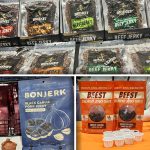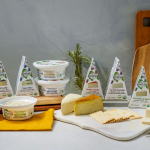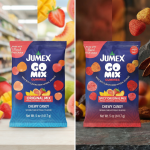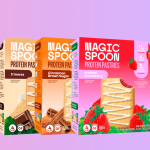Tosi Closes Investment to Grow Retail Presence

While the bar category may be a crowded set, Tosi Health thinks there’s room for one more leader at the top of the pack. And now, armed with new capital, the company has more gas in the tank to make this goal a reality.
The California-based company announced today the close of a round of funding led by Cambridge Special Projects Group (SPG). SBG Growth also took part in the round. While terms of the deal were not disclosed, Cambridge SPG COO and partner Filipp Chebotarev told NOSH that his firm made a “significant multi-million dollar investment” that puts the group in control of 22 percent of the Tosi brand.
Tosi is most widely known for its line of Superbites bars, which are sold in over 5,000 doors, primarily on the West Coast, including Peet’s Coffee, Chevron Extra Mile, regional Whole Foods Markets, Bristol Farms and Jimbo’s. The Superbites — which contains two servings per package — retail for roughly $3 and comes in plain, blueberry or cappuccino with a base of roasted almonds or cashews.
Tosi co-founder Stefanie Hults told NOSH that the company was previously funded through friends and family. Although Chebotarev and his partner Polina Chebotareva both personally invested in the company in early 2017 as well.
Hults added that that she originally thought her six year-old company was too small for a strategic investor, but after getting to know the Cambridge team she understood the benefits that partnering with a firm could bring. One example, she said, is that Cambridge has helped Tosi assemble a board of advisors that now includes Greg Fleishman, co-founder of baking brand Foodstirs and design firm Purely Righteous, and Gigi Lee Chang, founder of baby food brand Plum Organics.

Chebotarev, in turn, told NOSH that Cambridge was attracted to the Tosi product itself and the nimble team behind it.
“[Tosi has] come up with an incredible tasting product that is loaded with plant-based protein, which is of course a very hot and growing segment of the market. It’s also a very unique format,” Chebotarev said. “We also really liked the team, their drive, their passion and their ability to build this successful early stage brand with very little capital.”
He added that Cambridge also appreciated that Tosi has a proprietary process for forming its bars, which are not baked or extruded like many other offerings in the set. The result is a bar that has the crunch of a KIND bar but with less sugar and fat then the popular brand.
Going forward, the Tosi team will invest much of its focus on the snack side of the business — although it will continue to produce the assorted supplements and powders that it sells online. Hults told NOSH the brand plans to expand into single serve options and add more flavors, potentially including a nut-free children’s line. Tosi is already sold in the Middle East and plans to expand into the European market by early 2019.
Regardless of the direction the innovation takes, Hults told NOSH one thing she’s not interested in doing is pigeonholing the brand into use occasion or customer segment. Currently Tosi users — which range from children to seniors — consume the bar for everything from breakfast to a healthy dessert, she said.
“I think we are unique and I don’t think we’d partner ourself with one food tribe,” Hults told NOSH. “It is something that is really for everybody. People keep coming back because of the mouthfeel, the taste profile and the pure, simple ingredients. We’re not stuck in one place.”
















